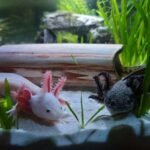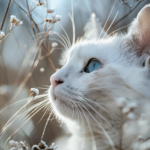Some friendships feel effortless from the very first moment, while others develop slowly over time through quiet understanding. The relationship between cats and introverts falls squarely into the latter category. There’s something almost magical about how these two naturally reserved beings find each other and form connections that run deeper than simple companionship.
When you think about it, the parallels are striking. Both cats and introverts move through the world with a certain thoughtfulness, preferring to observe before acting and valuing quality interactions over quantity. This natural alignment creates a foundation for relationships that feel authentic and deeply satisfying in ways that more demanding partnerships simply cannot match.
Shared Need for Personal Space

Cats and introverted people both need and respect personal space. This mutual understanding eliminates the exhausting negotiations that often occur in other relationships. When an introvert needs to retreat to recharge after a long day, their feline companion doesn’t take offense or demand attention.
“On average, cats are suited to providing company to a person at home engaging in solitary actives (such as reading a book).” This creates a perfect scenario where both beings can exist in the same space without the pressure of constant interaction. The cat might curl up nearby, offering silent companionship while the introvert processes their thoughts or engages in solitary activities.
Selective Social Bonding

Both introverts and cats can take a long time to form a bond with others, making us appear aloof to strangers. But once someone makes us feel seen – someone who passes the “you’re actually kind of OK” test – this rare person automatically levels up to VIP in our world. This selective approach to relationships means that when bonds do form, they’re typically deeper and more meaningful.
Just like introverts, cats are usually more selective with whom they show love and affection. They don’t go around wagging their tales at everyone they encounter like some other members of the animal kingdom. This shared selectivity creates relationships built on genuine connection rather than surface-level pleasantries.
The Power of Non-Verbal Communication

Compared to extroverts, introverted humans are good at perceiving non-verbal communication and often prefer non-verbal ways of communicating. Cats, being masters of subtle body language and silent signals, speak this same language fluently. A gentle head bump, a slow blink, or simply choosing to sit nearby communicates volumes without a single word.
Lastly, cats and introverted people are both good listeners. We may not say a lot, but we are always there to lend an ear. Our willingness to listen is one reason why we can form such close, loving bonds with each other. This creates a foundation of understanding that goes beyond verbal communication.
Recharging Through Solitude

We both need alone time to recharge and choose when to interact with others. Likewise, we don’t pressure others to be with us or talk to us unless they want to. This parallel need for downtime means neither party feels guilty about stepping away when social batteries run low.
Food + Affection + Quiet comforts = Kitty Joy! And what do you know – the equation for introverted bliss looks pretty similar. The simplicity of these shared needs creates a harmonious living situation where both can thrive without compromise.
Emotional Support Without Overwhelming Demands

Research shows that interacting with pets can lower stress levels and boost mood-enhancing hormones like serotonin and dopamine. For someone like me who can feel overwhelmed by social situations, this emotional support is invaluable. Cats provide this support without the high-energy demands that might exhaust an already drained introvert.
Studies have shown cats reduce stress and blood pressure levels in their owners. Additionally, research shows ESAs can lower anxiety, reduce depression, decrease feelings of loneliness, and may even offer benefits to those with PTSD. The therapeutic benefits occur naturally through companionship rather than through intensive training or overwhelming interactions.
Therapeutic Benefits of Feline Companionship

A cat purrs within a range of 20-50 Hz which is known to be medically therapeutic for illnesses in humans. A cat’s purr can not only lower stress it can also help labored breathing, lower blood pressure, help heal infections, and even heal bones. This biological response creates healing that happens simply through proximity and gentle contact.
Just petting a cat and listening to that purr can cause immediate relaxation and boost mood-elevating chemicals in the body, like serotonin. In fact, the frequency of a cat’s purr has been shown to promote healing! For introverts who often process stress internally, this natural healing mechanism provides relief without requiring emotional labor or complex social interactions.
Understanding Personality Compatibility

And, you guessed it, people who only have cats were more introverted. This statistical correlation suggests something deeper than coincidence. “Cats are quiet, they know how to entertain themselves, and they are all about comfort. They even get falsely accused of being aloof – something introverts understand well.”
Cat support was particularly appealing to students with the emotionality “Big Five” personality trait. The study found that students who exhibit the emotionality trait are especially interested in cat visitations. This research indicates that people who feel emotions deeply find particular comfort in feline companionship.
Building Meaningful Connections

Emotional support cats alleviate loneliness and isolation. The constant companionship minimizes the negative effects of spending time alone, with the added benefit of still having a generally independent animal that respects personal boundaries. This balance between connection and independence creates the perfect environment for introverts to thrive.
Both introverts (and cats) may not have many friendships or relationships, but when we do choose you, we’re usually loyal as hell. This loyalty creates bonds that weather the ups and downs of life, providing stability and unconditional acceptance that many introverts struggle to find in human relationships.
The connection between cats and introverts represents more than just pet ownership. It’s a partnership built on mutual understanding, respect for boundaries, and shared values around meaningful connection. These relationships thrive because they honor the authentic nature of both parties without demanding change or constant performance.
This natural compatibility suggests that sometimes the best relationships aren’t about opposites attracting, but about finding someone who truly understands your way of moving through the world. What do you think about this special bond? Tell us in the comments.






